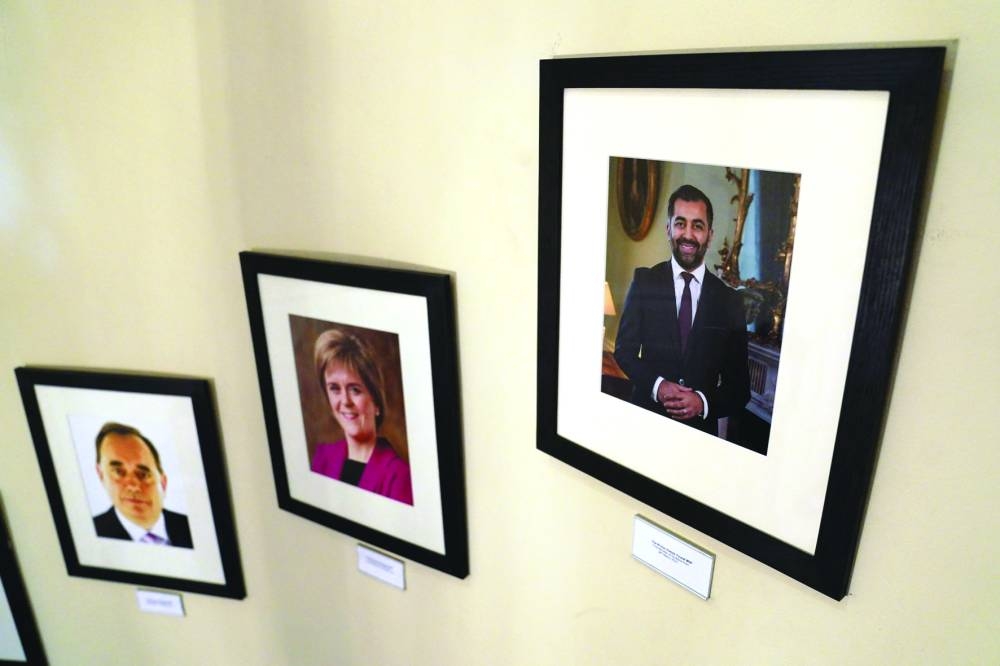Scotland’s First Minister Humza Yousaf announced his resignation yesterday ahead of two confidence votes this week sparked by his ditching of junior coalition partners in a row over climate policy.
The 39-year-old quit following a turbulent year as head of the Scottish government, during which support for his pro-independence Scottish National Party (SNP) has fallen.
The Scottish parliament now has 28 days to choose a new first minister. If the SNP’s new leader is unable to command support in parliament, a Scottish election will be held.
Yousaf said he had “underestimated” the hurt he had caused by ending a power-sharing deal with the Scottish Greens in the Scottish parliament last week.
His government had earlier abandoned ambitious targets for the transition to net-zero carbon emissions, angering the Greens.
The opposition Scottish Conservatives then lodged a vote of no-confidence in Yousaf, which was set for tomorrow and which the first minister was at risk of losing.
Scottish Labour lodged another no-confidence vote against his government.
The Tories, Labour, Liberal Democrats and Greens all said they would vote against Yousaf in the personal vote, forcing him to seek the backing of the sole lawmaker from the pro-independence Alba party.
Yousaf – the first Muslim leader of a major UK political party – told reporters at his official residence that he thought winning was “absolutely possible”.
However, he added that he was “not willing to trade in my values or principles or do deals with whomever simply for retaining power”.
“I have concluded that repairing our relationships across the political divide can only be done with someone else at the helm,” Yousaf said.
Yousaf became Scotland’s leader 13 months ago, after Nicola Sturgeon announced her surprise resignation after eight years in the job.
He won a bruising contest that exposed splits in the party between those on the left-wing and others closer to the right.
Yousaf said he would continue as first minister until a successor was elected “in order to ensure a smooth and orderly transition”, adding that the contest should start “as soon as possible”.
Ex-deputy first minister John Swinney quickly emerged as the frontrunner, receiving the backing of several senior SNP figures, including the party’s Westminster leader, Stephen Flynn.
Kate Forbes, who lost to Yousaf, was also spoken of as a contender.
Yousaf’s leadership hit trouble shortly after he took office when Sturgeon was arrested with her husband, Peter Murrell, over claims of mismanagement of SNP finances.
Murrell was charged in the case this month. Sturgeon has not been charged.
She oversaw a surge in support for the SNP, particularly after Brexit – in which Scotland opposed leaving the European Union – and during the coronavirus (Covid-19) pandemic.
However, the SNP, which has run the Scottish government since 2007, has suffered a drop in popularity under Yousaf.
He came under pressure over controversial new laws which made it an offence to stir up hatred against a number of groups, including transgender people.
The law has been heavily criticised, most prominently by Harry Potter author JK Rowling, who lives in Edinburgh.
Relations between the SNP and the Greens were also strained by the recent pause in prescribing puberty blockers in Scotland.
Some within the SNP wanted Yousaf to end the coalition because they felt the deal was pulling the party further leftwards.
“He mismanaged the break-up and failed to plan how he would govern without the Greens,” James Mitchell, politics professor at Edinburgh University, told AFP. “It was yet another example of the poor, often rash, decision making that has marked his leadership.”
The SNP’s slump has also come in the context of a resurgent Labour party, which is tipped to win a UK general election due later this year.
The SNP has 63 members in the 129-seat Scottish parliament – two short of a majority – and now runs a minority administration.
The next election is due in 2026.
This month, polling firm YouGov said Labour overtook the SNP in voting intentions for a Westminster election for the first time in a decade, raising the prospect of a reversal of the tide that swept most of Scotland’s seats in the UK parliament to the SNP in recent elections.
Labour’s resurgence in Scotland adds to the challenge facing British Prime Minister Rishi Sunak’s Conservative Party, which is lagging far behind Labour in UK-wide opinion polls.
Critics have accused the SNP, in power in Edinburgh for 17 years, of focusing on pursuing independence at the expense of issues like the cost-of-living, health and education.
The party has struggled to build momentum for another independence vote since Scotland voted against leaving the UK in a 2014 referendum.
The Scottish Parliament, re-established in 1999, has limited powers to set policy in areas such as health, education, transport and the environment.
The UK government retains powers for countrywide issues such as defence and foreign policy.

Portraits of Scotland’s First Ministers and SNP leaders (from left) Alex Salmond, Nicola Sturgeon and Humza Yousaf are displayed on the wall at Bute House, in Edinburgh.
